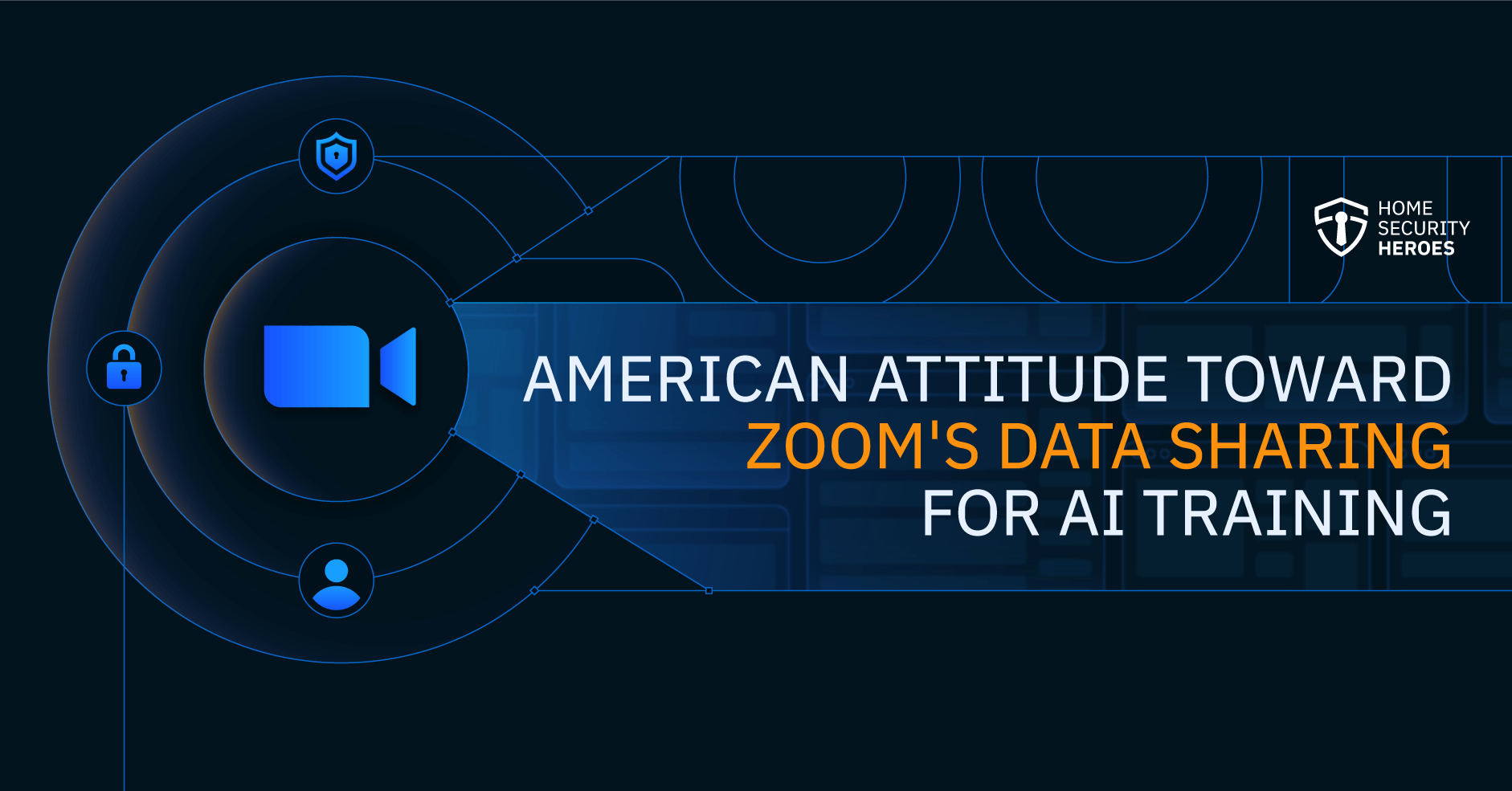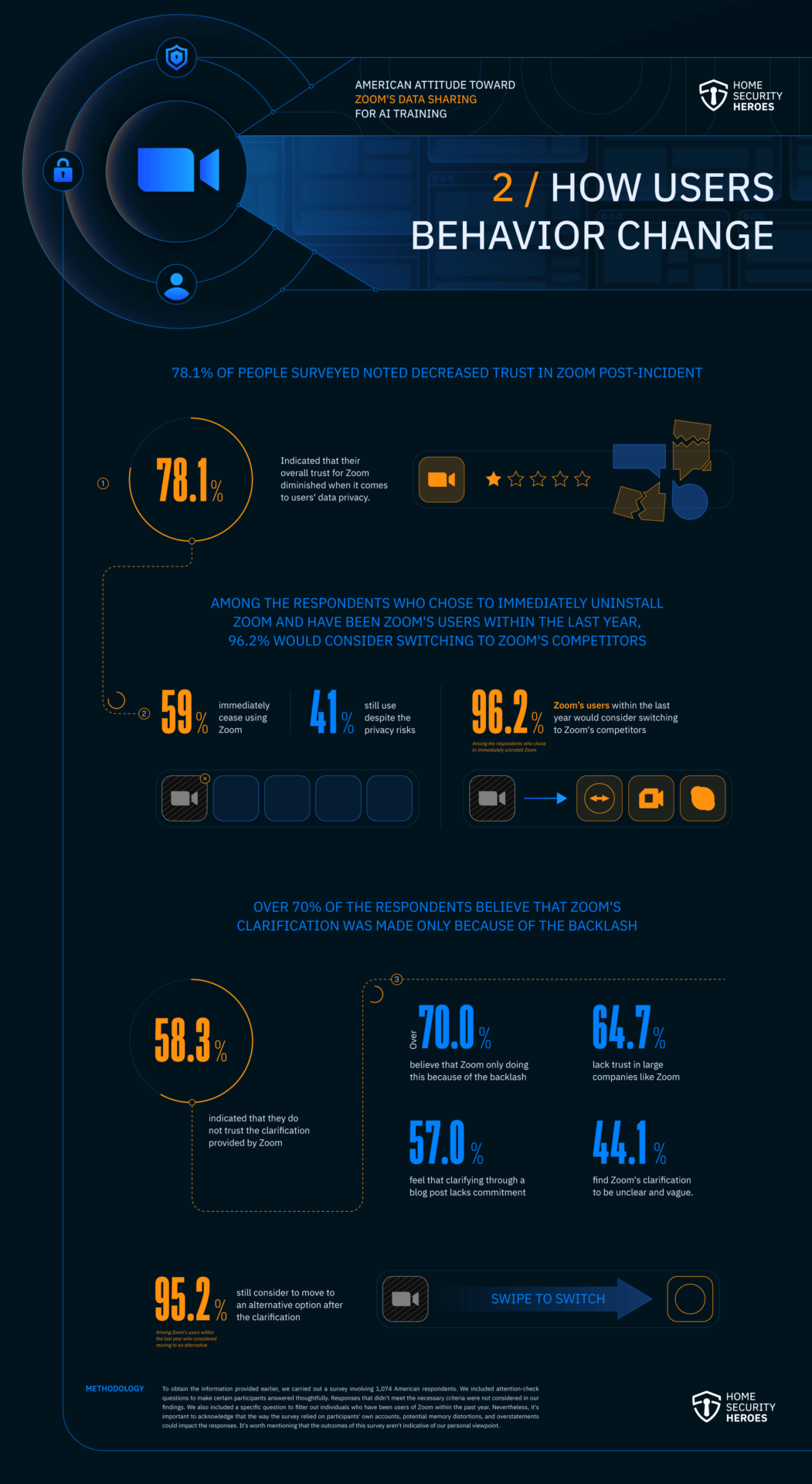American Attitude Toward Zoom’s Data Sharing for AI Training

With the rapid growth of AI, worries about cybersecurity and protecting personal data have intensified. The recent signs of companies accessing users’ information for AI training, particularly with the recent update of Zoom’s terms of service, have raised concerns regarding the ethical use of AI.
We conducted a survey to understand how users react to Zoom’s actions involving their data for AI training. By conducting a survey with 1,074 Americans, we observed negative thoughts and reactions on this matter, along with their specific viewpoints. Below is a summary of our findings.
Key Findings

Click to download the high-quality infographic
- 74% of survey participants disagree with Zoom using their data to train AI.
- Among those who disagree with Zoom, 85.3% believe they should be able to choose whether their personal data is used for AI training, while 83.5% see it as a data privacy threat.
- 78.1% of respondents noted decreased trust in Zoom post-incident.
- Out of respondents who chose to immediately uninstall Zoom and have been Zoom’s users within the last year, 96.2% would consider switching to Zoom’s competitors.
- Over 70% of those who disagree with Zoom’s clarification believe that the clarification was made only because of the backlash.
AI Training and Data Privacy
Zoom’s updated terms of service regarding users providing data for Zoom’s AI training without the option to opt out have sparked worries among the American population concerning the data privacy of major corporations. This section analyzes the user’s consent and attitudes toward Zoom’s actions.

Click to download the high-quality infographic
74% of Survey Participants Disagree with Zoom Using Their Data to Train AI
Among the respondents, 74% disagreed with Zoom’s updated terms of service regarding the usage of users’ data in AI training. Within this group, the majority belong to the Gen Y age group, followed by Gen X, the Baby Boomer Generation, and finally Gen Z. Only about 25,9% of people agree with Zoom’s updated terms of service.
Most Survey Respondents Feel Compelled by Zoom to Provide Data for AI Training and See It as A Breach of Data Privacy
When asked for specific reasons, 85.3% of the group that chose to oppose Zoom’s updated terms of service for collecting users’ data for AI training indicated that they believe they should have the option to decide whether their personal data is used for AI training. Meanwhile, 83.5% see it as a potential threat to their data privacy.
Additionally, 66.5% stated that they are concerned about their personal data being utilized for purposes beyond the scope of Zoom, such as hacking, selling, identity theft, and more. 56.9% also desire to be fully compensated if their data is used, and 43.9% of individuals expressed wariness and unease regarding AI and its progress.
Out of those who disagreed with Zoom, 97% perceive Zoom’s utilization of their data for training artificial intelligence as a serious threat to some extent.
How Users Behavior Change
This incident has also, to some extent, impacted and led to changes in the attitudes and behaviors of the general American population as well as Zoom’s specific users.

Click to download the high-quality infographic
78.1% of people surveyed noted decreased trust in Zoom post-incident
After this incident, 78.1% of respondents indicated that their overall trust in Zoom diminished when it came to users’ data privacy. This might affect how people see the Zoom brand.
Among the respondents who chose to immediately uninstall Zoom and have been Zoom’s users within the last year, 96.2% would consider switching to Zoom’s competitors
Due to the decline in overall trust, 59% have expressed their intention to immediately cease using Zoom. Within this subset, 96.2% of respondents who have been Zoom users within the past year are considering transitioning to an alternative.
Conversely, 41% of those who’ve lost faith in Zoom stated they would still use it despite the privacy risks.
Over 70% of the respondents believe that Zoom’s clarification was made only because of the backlash
Among the survey participants, 58.3% indicated that they do not trust the clarification provided by Zoom.
Within this group, over 70% believe that the clarification was solely a response to the negative public reaction. Additionally, 64.7% lack trust in large companies like Zoom, believing that such entities will continue using their data without consent.
57% of the respondents feel that clarifying through a blog post lacks commitment compared to rephrasing the terms of service. Besides, there are 44.1% of individuals who find Zoom’s clarification to be unclear and vague.
Furthermore, within the group of individuals who have expressed their willingness to switch to an alternative and do not trust Zoom’s clarification, 95.2% have stated that the clarification provided will not influence their decision to reconsider moving to another option.
Methodology
To obtain the information provided earlier, we carried out a survey involving 1,074 American respondents. We included attention-check questions to make certain participants answer thoughtfully. Responses that didn’t meet the necessary criteria were not considered in our findings. We also included a specific question to filter out individuals who have been users of Zoom within the past year. Nevertheless, it’s important to acknowledge that the way the survey relied on participants’ own accounts, potential memory distortions, and overstatements could impact the responses. It’s worth mentioning that the outcomes of this survey aren’t indicative of our personal viewpoint.
Get protected from data breach and identity theft, here our most helpful articles.